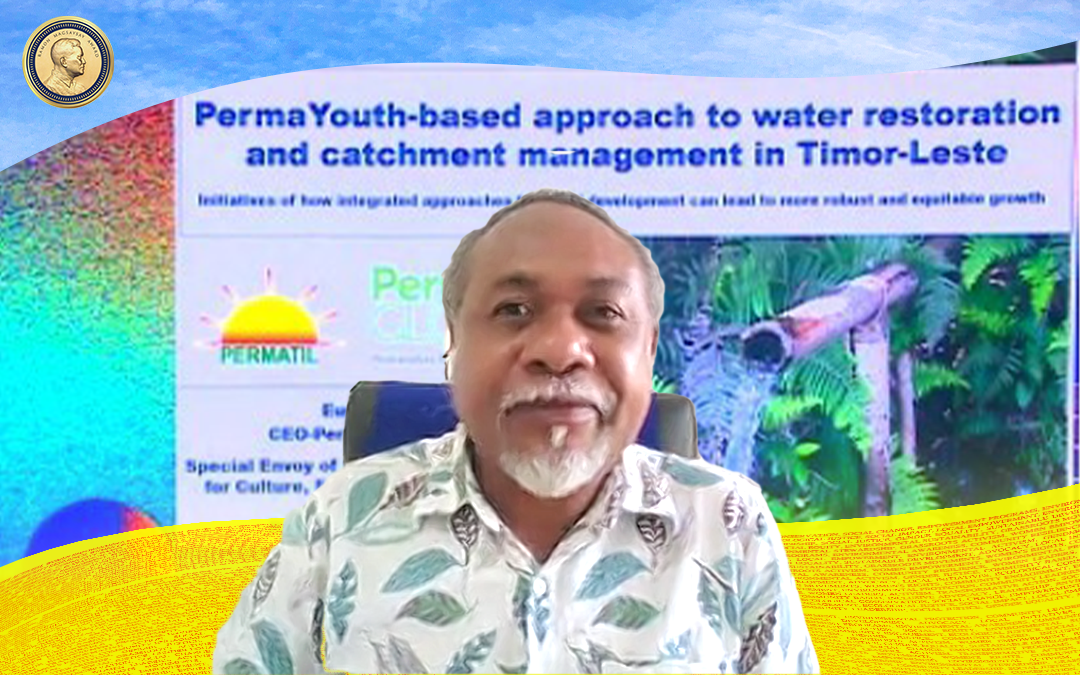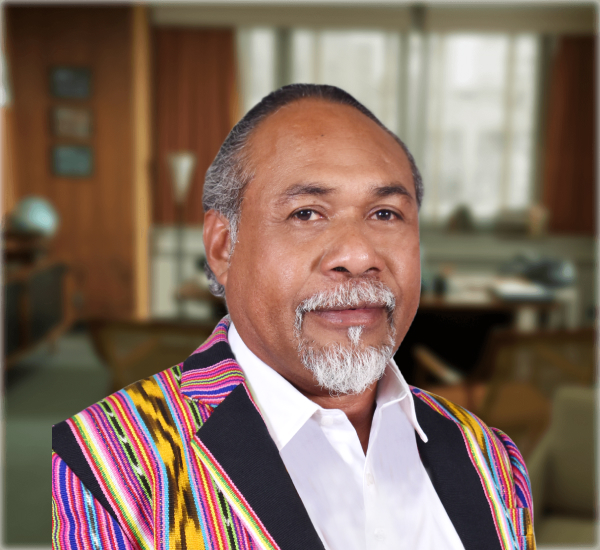Food sufficiency, environment conservation, local autonomy, social equity—these are urgent, bedrock concerns today. These challenges are addressed by governments, development agencies, multilateral organizations, and other institutions, but we have also seen that the most meaningful, impactful actions often come from the ground, from local communities and the people themselves.
An inspiring example is the story of fifty-one-year-old Eugenio Lemos of Timor-Leste. Lemos lived through the turbulent years of his country’s struggle for independence, that saw the Indonesian invasion and the bitter civil war that marked the country’s emergence as a fully independent nation in 2002. Such difficult beginnings devastated the economy, leaving 40% of the country’s mostly rural population living below the poverty line. For Lemos, born to a family of farmers, it was a tragic time as well. He lost his father and siblings during the war and had to help his mother in farm work at an early age. It would be his life.
He studied agriculture in a local university and took up such activities as starting a group to promote organic farming. In 1999, an Australian permaculture trainer, who was in Timor-Leste to train farmers in sustainable agriculture, introduced Lemos to permaculture, a holistic system for creating and managing sustainable agrosystems. It was not simply about transferring technologies but the cultivation of an ethos of responsible relations to nature and people, expressed in the words “earth care, people care, and fair share.” Lemos saw that many elements of this system were already present in traditional Timorese culture and he resolved that this was something he would devote himself to promoting among his people.
In 2001, Lemos established Permakultura Timor-Lorosa’e (Permatil). It has three main programs. A Youth Training Program that organizes three-day camps for youth seventeen years old or older, involving learning-and-fun activities in water and natural resource management, farming, aquaculture, and agroforestry. (Another camp for kids twelve to sixteen was later added, with simpler activities like gardening and preparing organic food.)
A School Garden Program implemented in public primary schools in which students tend vegetable gardens and learn composting, natural pest control, seed selection, and other skills. There is also a Water and Natural Resource Management Program that promotes “rainwater harvesting” by building ponds, swales, and terraces that store water, recharge aquifers, and regenerate springs.
Since 2008, the youth camp has trained more than 5,000 youth across the country. The School Garden Program has been established in more than 250 schools and, since 2015, has been integrated in the national public school curriculum. Permatil’s Water and Natural Resource Management Program has been introduced in all thirteen administrative districts of Timor-Leste. More than 1,000 water collection ponds have been built and 300 springs revived, benefitting over 400,000 residents or almost a third of the country’s population.
Charismatic, Lemos works with people from all walks of life—they are drawn by his open, humble, down-to-earth manner. Very much in character, he is an activist, a song writer and a singer who uses his songs as a medium to communicate the social issues he cares about. More than just about methods and techniques, Lemos promotes a whole way of looking at nature and people, particularly among the young. Taking time off for a scholarship in 2008-2010, Lemos earned a master’s degree in community development in Australia. What defines him today is that he is proud and respectful of his culture, grounded in local realities, and draws deeply from traditional knowledge what he finds essential to living. He insists, for instance, that what is needed is not simply “food security” or access to food (often commercial and imported) but “food sovereignty,” the country’s capacity to produce its own food, placing the premium on what is local, natural, and nutritious. Still, Lemos is mindful that what he is doing has lessons beyond Timor-Leste. He says, “My message to people—especially leaders of every country—is, think wisely. Don’t think only of how to create benefits for business without thinking about the impact on the environment. As world citizens, everything we do has an impact on others. We have one atmosphere, one water, one air.”
In electing Eugenio Lemos to receive the 2023 Ramon Magsaysay Award, the board of trustees recognizes his indomitable spirit in uplifting the lives of local communities, his vision and passion in integrating local and indigenous cultures in his advocacy for the care of the environment and the well-being of people; and for being truly a man of and for his people, and thus for the world as well.
First of all, I would like to extend my sincerest gratitude to the Board of Trustees of the Ramon Magsaysay Award Foundation for electing me to receive Asia’s premier prize and highest honor, the Ramon Magsaysay Award.
As we all know, man’s impact on our Mother Earth is at a critical crossroads, with many factors severely damaging our natural resources – our agricultural and terrestrial lands, and our marine and aquatic resources. Because of this, the food sovereignty of every country is currently under threat.
For many generations, humans have plundered Mother Earth’s resources in the name of capitalism, and in doing so we have robbed future generations – our own children and children’s children – of water security, of food sovereignty and of a life free of climate change.
The future that they face – a life filled with uncertainty, dangers, threats of displacement and extreme weather events is something I feel extremely concerned about. It is something that we all should be concerned about.
With today’s geopolitics of the current wars between Ukraine and Russia, and Israel and Palestine worsening the global food production and availability, many millions of people will go hungry and suffer from lack of access to quality, nutritious food and clean drinking water.
But through environmental advocacy, skills training and awareness-raising of ecosystem literacy, permaculture and traditional knowledge, we can build new generations of citizens who have the understanding, capacity, and confidence to effectively tackle climate change and its effects.
Young people of the world are key to achieving sustainable development and restoring the long-term viability of our environment across the globe. It is essential that all young people receive equal access to quality education and training, to social justice and quality health services, to protection from violence and abuse and to opportunities for employment and meaningful participation in society.
So, I ask all of us to make a commitment, to join forces and to act together in stopping the causes of climate change and ecosystem destruction. The time to mobilize everyone especially the youth of the world to rise above the environmental challenges ahead is now.
Permatil (Timor-Leste) and Permatil Global are committed to engaging all youths in the practice of permaculture through the PermaYouth in Action movement. This will grow new environmental leaders and equip youth to share the knowledge and skills with their communities. Knowledge and skills to rehabilitate environments, become water, seed, land and food resilient and implement climate mitigation and adaptation strategies.
The impact we can create together will not only restore local environments and offer sustainable local livelihoods but will multiply and spread far and wide – increasing the wellbeing of our communities, entire countries, and our planet, now and into the future.
The change begins with all of us. The time to do so is now.
Permaculture. Everyone. Everywhere.
Obrigado barak!
Related Articles


